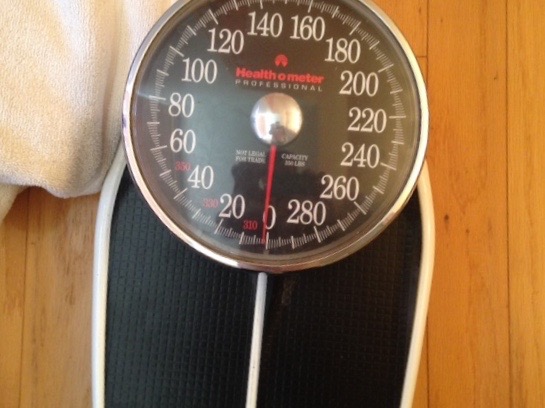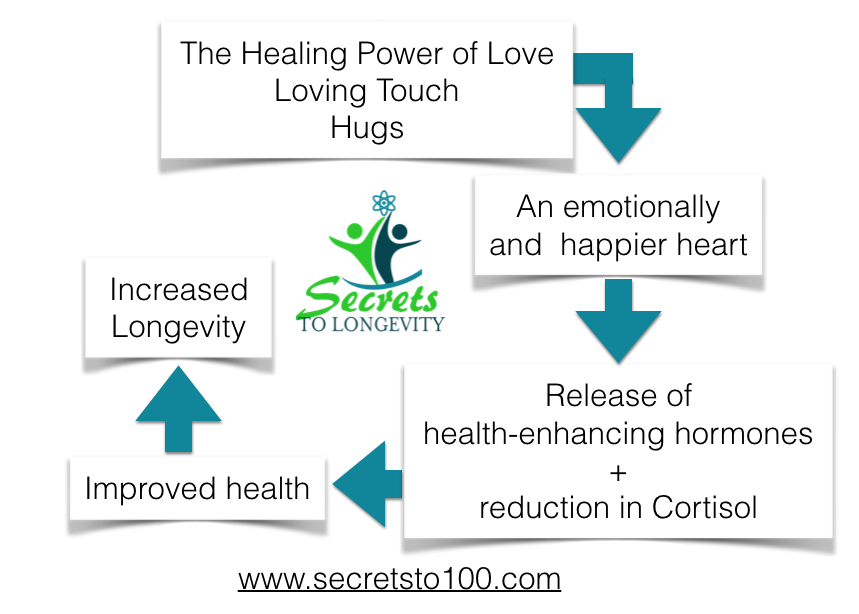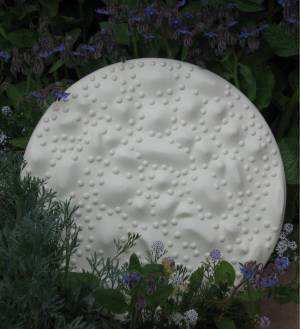The healing powers of love
Why do we so seldom hear about the healing powers of love? Why do we so seldom hear about 'love' as a health and longevity measure when the research is pretty conclusive. A loved heart is a happy heart. A happy heart is a vastly healthier heart. A healthier heart leads to longevity. We know that signs of love like hugging produces the health-enhancing hormone of oxytocin is released into our bodies by our pituitary gland, lowering both our heart rates and our cortisol levels. Cortisol is the hormone responsible for stress, high blood pressure, and heart disease.
We know and recognize love no matter our age, race or creed. Even premature babies (premmies as they are known: babies who weigh less than 1 pound at birth and on average only weigh 0.58 lbs) respond in remarkable ways to love. It's their extremely low body weights that keeps them in hospital and puts them at risk of dying. At the University of Miami (1), a group of preemies who were stroked through a whole in their crib for 10 minutes 3times a day, being fed exactly the same amount of food at the group who weren't stroked, gained anywhere from 21-48% of their body weight per day and could leave to go home anywhere from 3-6 days earlier. The infants who were touched also spent more time awake and being active, and showed more signs of being orientated and these positive effects persisted when they were retested 8 and 12 months after treatment and scored better on mental and motor tests 0 they also had fewer neurological incidences.
So why are touch and stroking such powerful parts of the healing powers of love?
Well some of the ways we receive the healing powers of love is through touch, stroking and hugs: we know their are ways people show their love and affection. Think about it this way: our skin is the largest organ in our bodies. To give you an idea, skin the size of an average size watch face has more than 3 million cells, up to 340 sweat glands, 50 nerve endings and 3 feet of blood vessels. Touch is a form of communication that brings about changes in our neural, glandular, muscular and mental systems as it reverberate through our bodies.
The healing power of love and touch
Research done with adults shows that regular touch lengthens our lives and cuts down on doctors visits. It releases seratonin and oxytocin (both health-enhancing hormones) and reduces cortisone (the stress hormone) - touch is a great stress reducer.
In a 2015 study published in the Journal of Holistic medicine, people were randomly assigned to either a control group that received traditional nursing care or an experimental group that received the same traditional nursing care plus touch. Data on pain levels, anxiety, blood pressure and pulse were collected both pre- and post intervention. Those receiving the healing touch, showed lower pain ratings, a decrease in the use of narcotics, and a decrease in anxiety. (2)
Animal studies show us something interesting: Newborn rats, who were held for 15 minutes each day for the the first three weeks of their lives, had vastly slower brain cell deterioration and memory loss as they grew old, compared with rats who hadn't been held. And maternal licking of rat puppies altered the HPA (Hypothalamus-Pituatary -Adrenal) reactions to stress through changes in gene expression in areas of the brain that regular stress response. Elevated HPA stress responses have been implicated in many conditions such as hypertension, diabetes, depression, anxiety, drug addictions and heart disease. (3)
You can see the effect of the healing powers of love in the cholesterol levels of rabbits too. And rabbits that were fed a high-cholestrol diets and petted regularly had 60% less blockages in their arteries that rabbits on the same diet without the petting. (4)
When employees received healing touch they showed a significant reduction in blood pressure (5), anxiety (6) and job stress, and had increased speed and accuracy when solving problems (7). People with ailments ranging from burns (8) to eating disorders (9) to HIV patients have been shown to benefit from soothing touch, with stress hormone levels, anxiety and clinical symptoms all reducing while HIV patients also had increased numbers of immune cells to combat the virus.
Touch can change your immune system, your hormonal system, your stress system - it can literally change how your entire nervous system operates.
We need to be touched just as we need food, water and air. We've all experienced that sense of bonding through hugs or being touched on a shoulder. Touching is a way of communicating love, reassurance and support without words that people who feel uncomfortable in their bodies.
(1) Premmies
(2) Healing Touch
(3) Liu D, Diorio J, Tannenbaum B, et al. Maternal care, hippocampal glucocorticoid receptors, and hypothalamic-pituitary-adrenal responses to stress. Science. 1997;277:1659–62.
(4) Nerem, Robert & J Levesque, M & F Cornhill, J. (1980). Social Environment as a Factor in Diet-Induced Atherosclerosis. Science (New York, N.Y.). 208. 1475-6. 10.1126/science.7384790.
(5) Shulman KR, Jones GE. The effectiveness of massage therapy intervention on reducing anxiety in the work place. J Appl Behav Sci. 1996;32:160–73.
(6) Field T, Ironson G, Scafidi F, et al. Massage therapy reduces anxiety and enhances EEG pattern of alertness and math computations. Int J Neurosci. 1996;86:197–205. [PubMed]
(7) Field T, Peck M, Krugman S, et al. Burn injuries benefit from massage therapy. J Burn Care Rehabil. 1998;19:241–4. [PubMed]
(8) Hart S, Field T, Hernandez-Reif M, et al. Anorexia nervosa symptoms are reduced by massage therapy. Eat Disord. 2001;9:289–99. [PubMed]
(9) Ironson G, Field T, Scafidi F, et al. Massage therapy is associated with enhancement of the immune system’s cytotoxic capacity. Int J Neurosci. 1996;84:205–17. [PubMed]
How we don't receive massage therapy benefits has to do with our we feel about touch
How we feel about touch depends largely on which culture we're born into. In the 1960's couples in coffee shops in various parts of the globe were observed relative to the number of touches they exchanged. In Puerto Rico couples touched approximately 3 times a minute, in France 1.8 times, in America 0.03 times and in London... they didn't touch.
Sometimes though we've had something happen that we have internalized the message that touching can be shameful, sinful and dangerous and something to be avoided because of what it could lead to. We may not even realize we have these subconscious beliefs that make us feel inhibited about natural physical contact with others.
And certainly that would be a reason why many overweight people go without touch as well as massage therapy benefits. They're ashamed of being touched.
It's also why massage devices like the Reflex-o-Board and also the aquamassager have become so popular.
I hated being touched
But how we feel in our bodies also affects how we feel about being hugged, caressed and making love. I know that when my negative body image was enormous (ironically mostly when I had a gorgeous body) I was quite sure that all my husband was thinking about was how much he hated touching my fat and revolting body but felt he should put on a good show out of duty.
I was wrong, he merely hated how much I hated being touched, and how I would squirm away, or get changed with the lights off or pretend to go to bed early and be asleep to avoid love-making.
Even an affection hug was something to have body worry about: would he feel that roll bulging over my jeans or around my bra strap? As for love-making... well I wasn't really present because I was so busy in my mind worrying about all the body parts that I was quite sure he was thinking negatively about. Talk about projecting my thoughts onto him -- poor guy!
One of the things that I think has been healing from a 'being touched and body image point of view' is going for massages and enjoying the many massage therapy benefits. Not just different kinds of massages to find out which I like best, but also going to different massage therapists to see if I felt any different about my body from one therapist to another.
Going for massages has been a way to build my self esteem. Just being able to go naked has done wonders for how I feel in my own skin.
Do you go for massages? What are the massage therapy benefits you think you receive from them and most importantly do you think they have any impact about how you feel in, or about, your body?
These are what some of the online members said when I asked them about body massages:
"I have never had any negative feelings about showing my body to a therapist, because I feel that they've seen in all and look on my body as an instrument to work on and heal, not to deride in any way."
"Well, I never had the opportunity to have a full body massage, but I am dreaming of it! I think that one of the reasons why I never had one before is that it feel "wrong" to spend so much time and money on my body! Although I think that I am a bit scared of what the therapist might think of my body too. So I am always have this idea that I will go to a place where they will never see me again. Sort of in cognito."
Share your Thoughts and Ideas?
 Everyone has an opinion- and yours matters: What do you like/dislike/agree with/disagree with about what you've read? What other information would you like to see more of? What would you like us to know?
Everyone has an opinion- and yours matters: What do you like/dislike/agree with/disagree with about what you've read? What other information would you like to see more of? What would you like us to know?
What Other Visitors are Thinking
Click below to see contributions from other visitors to this page...
I'm interested in this article on massage therapy benefits 




What a great article. I am going to share it on Facebook. I a large woman as well as a massage therapist of almost 17 years. I have been receiving massages …
There's no doubt that having our body touched is something that changes when we aren't feeling comfortable in our bodies.
Watsu:
a Water Massage
Click here to read about my investigation into the most amazing water massage.
Aquamassage:
a Water Massage without touch
Click here to read about my investigation into a water massage where no human touch is involved.
Touch Me:
a Swedish Massage
Click here to read how I feared touch but was touched by it.

